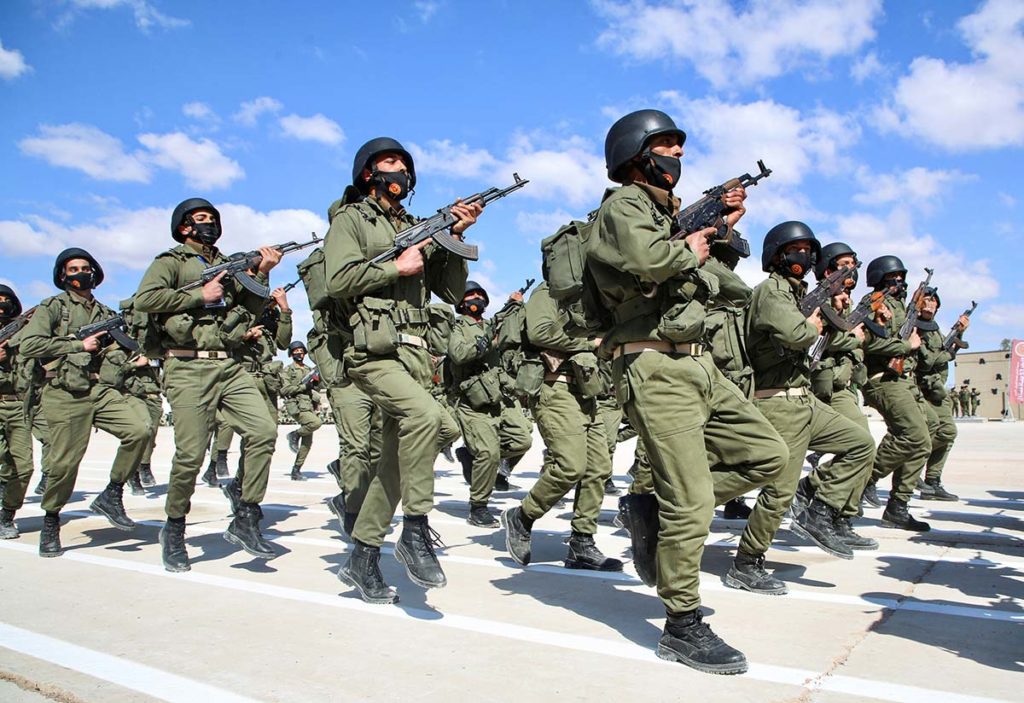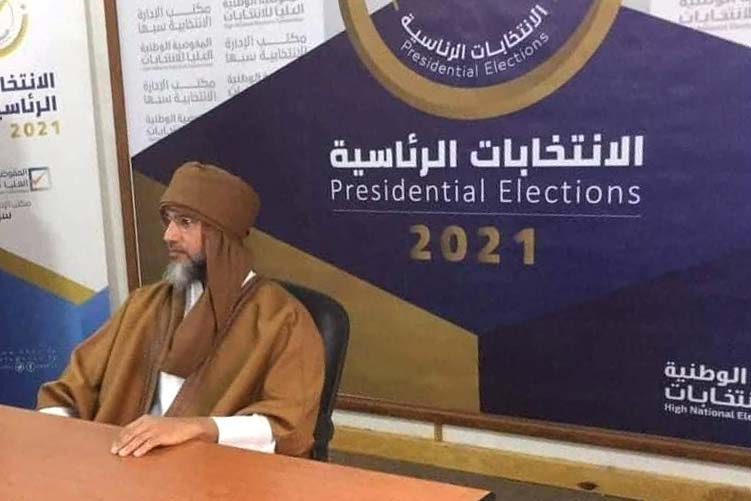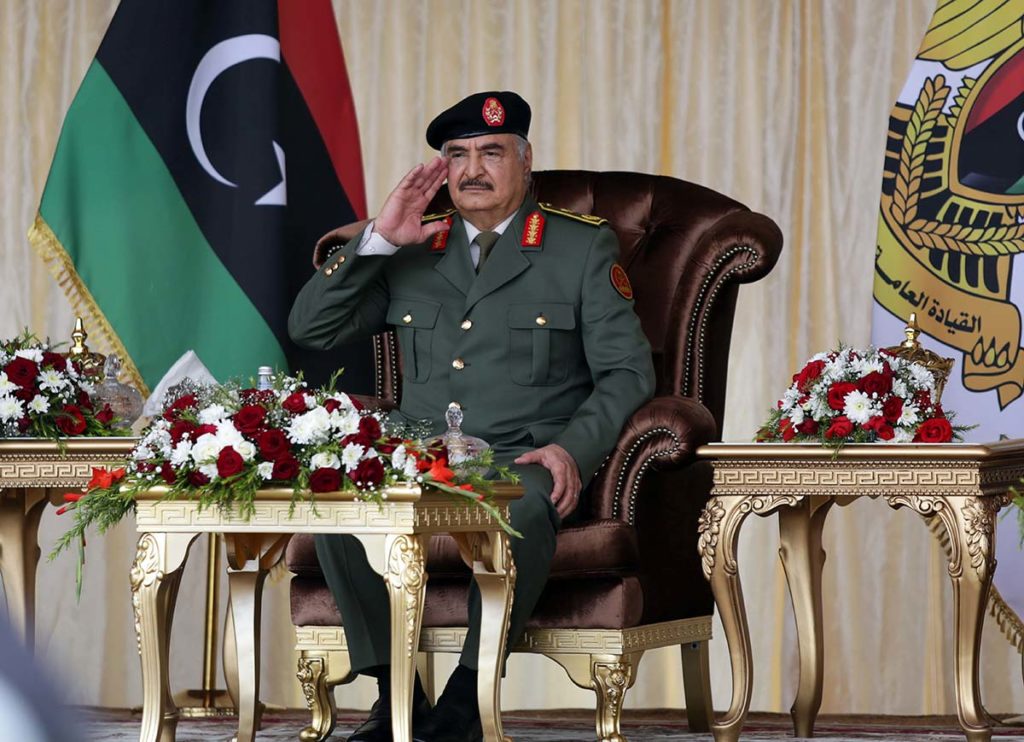Libya’s first presidential elections since the 2011 ouster of Muammar al-Qaddafi, scheduled for Dec. 24, have been postponed indefinitely. That outcome was not surprising, as the country’s two competing parliaments couldn’t agree on a framework for the vote. One major faction argued that it would premature to elect a president before a constitution was ratified, and others wanted to void laws that would have barred their favored candidates. Libya still has no universally accepted central government, with three foreign armies and numerous mercenaries, terrorist groups, and local militias operating within its borders. Omar Hammady reports.
Elections in Libya, envisioned by the United Nations-facilitated political dialogue and scheduled to take place last Dec. 24, failed to materialize. This was the predictable outcome of a process riddled with built-in self-defeating factors and whose implementation favored legal, constitutional, and political acrobatics. The process was beleaguered by two interrelated issues: differences over the idea of holding a presidential election in the current situation, and the resulting failure to reach the required consensus on a framework for elections.
The collapse of this process is likely to trigger political disintegration, including the emergence of rival governments and a credible risk of military escalation. As a result, the widely supported elections that were meant to instill the country with unified, legitimate institutions and rid it of the currently competing assemblies will be relegated to the distant horizon.
The process stemmed from attempts to overcome the 2014 post-electoral crisis that resulted in competing claims for legitimacy by two houses: the newly elected House of Representatives, based in the country’s east, which eventually saw its election annulled by the Supreme Court, and the previous parliament, the General National Congress in the west, which claimed continued legitimacy.
To overcome this conflict, both houses signed a UN-brokered compact known as the Libyan Political Agreement in Morocco, in December 2015. The agreement maintained both bodies and made them co- legislators on all laws and constitutional arrangements necessary for the transitional process.

The two houses dramatically failed to reach a consensus, though, and the country continued having two competing governments through 2019. UN efforts to move the process forward via a national conference were then frustrated by General Khalifa Haftar’s attempts to settle the conflict militarily through his war on Tripoli. Following his defeat, an international and regional consensus allowed for renewed UN efforts to reinvigorate the political process. This was reflected in the Berlin Conference of January 2020.
The conference’s conclusions called for the establishment of a presidency council, the formation of a government, and the resumption of a political process “paving the way to end the transitional period through… parliamentary and presidential elections.”
To put the Berlin conclusions into operation, the UN mission created a Libyan Political Dialogue Forum (LPDF) with 75 members. This forum met in Tunis, Tunisia, in November 2020 and adopted a road map envisioning a new transitional phase of 18 months, to be led by a newly selected presidency council and a government of national unity, and to culminate in simultaneous presidential and parliamentary elections on Dec. 24, 2021.
The road map provided that the two houses, the House of Representatives and the High Council of State, must agree on a framework for the elections within 60 days. If they failed to do that, the LPDF would decide on the matter. However, neither the two houses nor the LPDF adopted a framework. In both forums, differences centered on the presidential election.
Scheduled too soon?
Holding a presidential election has been controversial in Libya since 2011, when longtime leader Muammar al-Qaddafi was overthrown. It was ruled out by representative bodies in 2012 and in 2013, ahead of national elections scheduled for 2014, and again in 2014. The rationale, mainly put forward by the revolutionaries, known as the February camp, was that electing a president during the interim period would predetermine the nature of the political system to be established by the permanent constitution. In addition, they were concerned that imposing a strong president on a weak state could pave the way for authoritarian rule.
When the various bodies set out to adopt a framework for the Dec. 24 elections, this issue surfaced again. The debate revolved around two points: whether Libya should have a presidential election at all, and, if so, who would get to run in it.

On the first question, House of Representatives Speaker Aguila Saleh, General Haftar, and former Interior Minister Fathi Bashagha each believed they had a high chance of winning the presidential poll, and insisted that a presidential election was the only way the country could be effectively governed. Supporters of the former regime also promoted the idea, believing that their candidate, the former leader’s son Saif al-Qaddafi, also stood a good chance of winning.
The February camp, on the other hand, generally reiterated its opposition to a presidential election before a permanent constitution, using the same rationale laid out in 2012 and in 2013. They also rejected Haftar’s and Saif al-Qaddafi’s candidacies, seeing both as convicted criminals and fugitives.
Ordinary Libyan laws would ban Haftar from running because he is an active-duty military officer and holds dual citizenship, in Libya and the U.S. His supporters insisted that conditions for eligibility should be adjusted to enable him to run. Likewise, supporters of the former regime insisted candidates accused of crimes shouldn’t be barred unless they’ve been convicted.
These disagreements prevented the LPDF from agreeing on a framework for elections. The UN mediator also abstained from putting forward any bridging proposals. Yet the international community was desperately trying to achieve what seemed to be its only agenda for Libya: the presidential and parliamentary elections on Dec. 24.
Exploiting this international despair, on Sept. 8, 2021, Speaker Saleh unilaterally issued a “presidential electoral law” without holding a vote in the House. The law amended the agreed-upon electoral sequence by providing for presidential elections to take place ahead of parliamentary elections; included provisions of a constitutional nature such as presidential powers and terms, and loosened the eligibility criteria to let military personnel and dual-citizenship holders run for election.
The UN Support Mission in Libya and other international actors in Libya supported this supposed law. This was a turning point, as the mission’s mandate is precisely to “further the continued implementation of the” Libyan Political Agreement, which requires a consensus between the two houses on such a law. Expectedly, international support emboldened Saleh, who one month later issued a “parliamentary electoral law,” again without any vote.
Ignoring court decisions
By supporting laws that violated the Libyan Political Agreement, the international community weakened the standing and authority of the internationally endorsed framework. That deprived the process of an authoritative source to refer to in case of disputes. This made it easier, in the implementation stage, to disregard any related rules.
During the process of establishing who would be eligible to be a presidential candidate, it appeared that supporters of the disputed electoral laws intended to abide by them only to the extent that their political rivals would be effectively prevented from running. These included in particular Prime Minister Abdul Hamid Dbeibah, who had signed a pledge not to run for election, and Saif al-Qaddafi, who was under arrest warrants from Libyan courts and the International Criminal Court.
Both Dbeibah and Qaddafi submitted their candidacies and were approved by the courts, and they soon emerged as the likely front-runners. Consequently, supporters of a presidential election rejected the relevant courts’ decisions and called on the country’s electoral body to suspend preparation for elections. The latter eventually declared that a force majeure, resulting notably from a political rejection of some candidates, prevented the holding of elections.
The elections’ failure was also predictable in light of other self-defeating factors in the very design of the process.
First, there is the framework established by the Libyan Political Agreement, which granted the two houses a veto power on the elections that would spell their own demise. The LPDF road map did little to address this, which it could have done by using an alternative route offered by the 2015 agreement.

Second, the decision to rush elections was problematic. Lessons learned from comparable experiences, including Afghanistan, Iraq, Angola in 1992, Liberia in 1997, and South Sudan since 2010, show that early elections in post-conflict societies entail risks of the conflict resuming. Libya still has three foreign armies and 10 foreign mercenary groups operating on its soil, in addition to terrorist groups and countless local militias. Its current prime minister cannot visit large parts of the country, and critical state institutions are yet to be unified. This suggests that a conducive environment for elections does not yet exist.
Third, a number of items that were to help build that conducive environment, such as national reconciliation, decentralization, and unification of state institutions, were neglected or, at best, dealt with as secondary technical issues. Merely setting a firm election date was not sufficient to create the necessary environment.
Fourth, the LPDF road map provided for two mutually exclusive dates: Dec. 24, 2021, for the elections, and an 18-month preparatory phase that would culminate in elections. The Dec. 24 date was adopted in an improvised manner and juxtaposed with the 18-month timeline. This confusion was reflected only in the Arabic version of the road map, the one Libyans had negotiated and agreed to. The English version, which the diplomatic community worked from, referred only to Dec. 24 – causing misunderstandings between Libyans and their international partners.
Finally, precedents established while selecting the executive authority in February 2021 proved to be fatal. It was then allowed for both active military personnel and sitting judges to run, in violation of current laws. This diluted the rules on eligibility and deprived the process of strong precedents rooted in Libyan law and practice.
A flawed process
In sum, the rush to hold an election based on a disputed legal framework undermined the standing and authority of the process’s governing framework, including Security Council resolutions. It also set poor precedents for laws being issued by one individual, undermined the credibility of the country’s independent electoral body, and, ultimately, endangered Libya’s fragile peace.
The elections’ failure reflects existential fears among many constituencies. It is a reminder that elections in Libya need to contribute to a peaceful process and outcome – rather than being treated as an end in themselves. They need to be framed in a nonpolarizing manner and to unfold in a conducive environment. Timelines are important, but need to flow from thorough context-based assessments. They do not make a process by themselves, nor can they be a substitute for credible and accepted mediation.
As Libya continues its downward trajectory with the emergence of rival governments and risks of military escalation, international mediation should focus on keeping the country’s institutions unified and building the environment for an agreed-upon and well-prepared election.